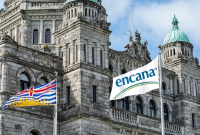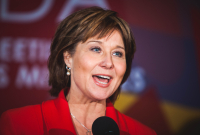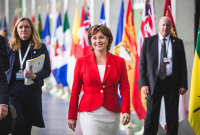Support strong Canadian climate journalism for 2025
Gitxsan hereditary Chief Yvonne Lattie of the Gwininitxw house group was in National Observer’s offices this week describing how, even after decades of court victories and promises of reconciliation, her community doesn’t truly have a voice at the table.

Chief Lattie and another hereditary chief, Charlie Wright of Luutkudziiwus, have launched a court challenge against Pacific NorthWest LNG’s plans to build a massive liquefied natural gas terminal near Lelu Island. The chiefs warn the project could trigger the collapse of the province's wild salmon runs, which are among the largest in the world and a vital part of their culture.
As part of the LNG project, TransCanada plans to build a natural gas pipeline through the Gitxsan Nation’s traditional territory in Northern B.C., and Chief Lattie is particularly worried about plans to run a pipeline right under a lake. The community has been raising their voices for years but feel they just don't get heard in the provincial capital.
Community voices are drowned out by decibels of oil and gas lobbying and piles of industry cash, quantified in a new study released by the Canadian Centre for Policy Alternatives this week. National Observer's Carl Meyer reported on the truly stunning volume of lobbying and a “barrage” of oil and gas donations to Premier Christy Clark’s Liberal Party.
It's so routine-seeming at this point that it's gotten hard for many British Columbians to summon (more) outrage over the unlimited stream of political donations to the B.C. Liberals — the New York Times recently dubbed B.C. the “‘Wild West’ of Canadian Political Cash.”
But the sheer scale of fossil fuel influence revealed in the new research is shocking to us, even by Wild West standards:
B.C. government officials are taking meetings and being lobbied 14 times per business day on average... just by the top ten most frequent companies and associations.
22,000 lobby sessions by fossil fuel companies and associations over the past six years.
$5.2 million in political donations from fossil fuel companies and industry associations between 2008 and 2015.
92 per cent of those donations went to the B.C. Liberal Party.
A majority of the fossil fuel companies and associations donating and lobbying are based outside B.C. (in Asia, the U.S. or Alberta).
B.C. has no limits on political donations. (Don't worry, you got that right. Zero.)
Justin Trudeau recently had to back down following public outrage over $1,500 per plate fundraising dinners. Christy Clark's most exclusive receptions cost as much as $20,000.
Foreigners, corporations and wealthy individuals are allowed to give freely to all political parties.
But it turns out that fossil fuel and mining interests are betting almost exclusively on one party these days.

What's the average citizen to make of all this?
It’s beyond naive to think that any corporation, let alone one from outside the province, would give money away with no expectations. Or that the governing BC Liberals would feel no pressure to deliver to their financial supporters. And, for ordinary people watching this spectacle, it makes government decisions on industrial projects or regulations seem suspect.
There are divisions amongst the Gixtsan about the merits of LNG, but Chief Lattie, the 68-year-old mother of seven children and eight grandchildren, rightly worries about government motivations behind pipelines and fracked gas.
In addition to LNG projects, many First Nations across B.C. are incensed by the bulldozer tactics being used to get construction of the Site C dam past the "point of no return" before the provincial election in May. Elections BC is reviewing Kinder Morgan's super sized donations to the B.C. Liberals after a formal complaint they may have influenced the decision to accept the Transmountain pipeline expansion project last year.
The Clark government is under fire on a number of fronts related to industries making big donations. Decisions by the B.C. Liberals show a pattern of favouritism towards industry that we find increasingly distressing and worthy of much more investigation.
Mining
The B.C. government is accused of lax regulation and oversight of the mining industry. Last year, the B.C. auditor general warned that the ministry of energy and mines was “at risk of regulatory capture.”
“The compliance and enforcement activities of both the Ministry of Energy and Mines and Ministry of Environment are not set up to protect the province from environmental risks,” said the auditor general.
There have been a series of recent mining disasters in B.C.. Most famously, the 2014 Imperial Metals’ tailings pond failure at its Mount Polley copper and gold mine. Millions of cubic metres of toxic tailings cascaded into nearby lakes and rivers in the worst mining spill in Canadian history. A year-long investigation concluded that the disaster was caused by "poor practices" but no fines were levied and no charges were laid. In addition to Imperial Metals own donations, it emerged that the company's controlling shareholder, Murray Edwards, had donated half a million dollars to the B.C. Liberals prior to the disaster and organized a $1-million private fundraiser for Christy Clark's re-election campaign at the Calgary Petroleum Club.
This week a coalition of First Nations, doctors and NGO’s called for a judicial inquiry into mining regulation. Calvin Sandborn, legal director at the University of Victoria’s Environmental Law Centre cited, “repeated instances where it has been shown the the regulatory system has failed.”
Fossil Fuels and Climate Change
Massive oil and gas industry donations also raise questions about B.C.’s decisions regarding climate change. The B.C. government is headed in the entirely wrong direction on climate change — climate pollution in the province is going up while provinces like Ontario and Quebec are making progress.
The Christy Clark government rejected the majority of recommendations from its own Climate Leadership Team in 2016 which had presented a plan to reverse the trajectory of B.C.’s climate pollution.

The province is working hard to convince Malaysia’s Petronas to build a liquefied natural gas plant that would be the largest greenhouse gas emitter in Canada. LNG projects make strange bedfellows. Petronas is wholly owned by the Malaysian government and supplies as much as 45 per cent of its budget.
Little surprise that Rich Coleman, minister of natural gas development, was the minister most heavily involved in lobbying by the fossil fuel firms.
Time for an Inquiry
It’s long past time to clean up political cash in the Wild West and to launch a corruption inquiry into industry influence and political donation rules in B.C. along the lines of the federal Gomery Inquiry or the Charbonneau Commission in Quebec. The Quebec commission developed recommendations for restoring public trust in political decisions after looking into corruption and collusion in the construction industry.
National Observer reported earlier this week on similar concerns over the awarding of provincial contracts to paving and road maintenance companies in B.C.. Companies that make donations to the governing Liberal party “received nearly twice as many contracts from the provincial government on average than companies that did not donate.”
The unrestricted flow of industry money into party coffers is corrosive to democracy. After all, corporations are under legal obligation to spend money with an expectation of return on their investment. The public has every right to suspect government is in the pocket of the rich and powerful — a situation that can only inflame the angry forces of anti-government populism.
Media is not immune to fossil fuel cash
Free and independent journalism has traditionally been a crucial bulwark against government corruption. But Canadians have reason to worry that fossil fuel interests have also penetrated big media.
So much of the news Canadians hear about the energy industry is framed by the supposed inevitability of continued oil and gas production. One of the primary reasons for establishing National Observer was to provide energy reporting in a climate change context and journalism that's not afraid to dig into the activities of regulators and companies behind fossil fuel projects.
If you're a long time reader, you've received reporting about fossil fuel industry influence over Canada’s largest newspaper chain, Postmedia. In one instance, Postmedia actively courted the Canadian Association of Petroleum Producers, offering "topics to be directed by CAPP and written by Postmedia." That was several years ago and we have no evidence of whether this relationship continues, but we certainly don't see the regular, hard-hitting, critical reporting on the gas and oil industry we would wish to see from Canada's largest newspaper chain.
Even the much beloved CBC is apparently not immune to influence. Friends of Canadian Broadcasting points to an enduring legacy of the Harper government — seven of the nine CBC board members are donors to the Conservative Party. Anchor Peter Mansbridge had come under criticism for receiving large speaking fees from oil and gas lobby groups — $28,000 for one single speech to CAPP.
When you subscribe to National Observer, you empower independent journalism. There are no big hedge funds and no fossil fuel associations, just solid research and reporting on issues that matter to you, your family and your community.
Our reporters have been poring over the data on political donations meticulously. They've been double-checking and triple-checking every number, report and contract.
But all of that work takes countless hours and thousands of dollars.
We don't have the millions or billions of these lobbyists and so we count on you to subscribe and be a part of our investigative efforts.
Please subscribe today. Help amplify voices that should be at the table and hold governments accountable to the people they're meant to serve.
The future may depend on it. B.C.'s next provincial election takes place in early May. It's our job to provide voters with the information they need to shape a positive future for British Columbia's next years. With your help, that's exactly what we'll do.









Comments
Thank you for this article. Is there a petition to demand an inquiry? Will you, Lead Now or another like minded organization create one?
Articles like this always send me to the Wikipedia to get the crucial bit of information that they never, EVER, not ONCE, happen to mention: how many people are involved. Vast efforts went into summing up the amount of money, not a minute into counting human beings.
There are about 13,000 Gitxsan in total, perhaps 5,000 living in their "traditional lands".
As Jon Stewart's Daily Show pointed out over a year ago, there are about 20 continent-crossing pipelines from Canada to the US alone, already, the XL was just one more, not some environmental apocalypse. A pipeline on your land represents a risk, yes. So does the pipeline feeding gas into your house, and ten million others. Every few years, one of those houses blows up, out of ten million - we go on using gas for heat, though, we bear the risk. Just as countless farmers across the continent bear the risks of pipelines crossing their land, generally because they've been compensated for it and the spills are generally contained. No farm has ever gone out of business entirely from a pipeline spill - many have lost a few acres, some have lost several acres - and been compensated.
Only when these same pipelines that cross ten thousand farms cross First Nations does the media react like it's the End Times.
Five thousand Gitxsan have a right to consultation and compensation, but when you burrow into the complaints, they are generally complaining after consultation and compensation - they just didn't like the outcome enough.
But it's not just money swaying the outcome, it's thousands of jobs-- frequently more jobs than the entire Native population involved...many of whom have no objection to the project, a split their leaders rarely mention.
Also, can this "hereditary chief" stuff be buried in the past? Can these folks run an election, please?
Roy Brander, BC will look like a Spider Web of Pipelines if all the LNG Export Terminals come to fruition. The Province and Pipeline proponents had a unique opportunity to have Secretive In Camera Meetings with Blood Line Monarchy, Hereditary Chiefs making decisions without their peoples being consulted. True democracy by exploitation, i’m having a tough time blending the two together as being ethical in 2017.
Your exaggeration that there are thousands of jobs at stake. Compressor Stations are operated Remotely from Calgary. C’mon Roy pipelines are put in at dizzying speeds by Government Regulated Crane operators and Unionized tradesman. All 13,000 Gitxsan whether on Reserve OR not are Entitled to be Consulted, educated and given Compensation. Do you want Case Law to verify that. I have grandchildren Off Reserve whose Trust Fund is growing from Hydro Electric Developments long before their parents were even born.
Should we discuss the Armageddon effects of Fracking, causing Seismic Activity? The proposed pipeline route pass’s through an area with past Volcanic activity. There is even a Volcanic Peak which is a Tourist Attraction. Ref;
Fracking triggers 90% of large quakes in B.C., Alberta oil and gas ...
www.cbc.ca/.../british-columbia/more-than-90-of-larger-earthquakes-in-we...
4.6-Magnitude Earthquake in British Columbia Caused by Fracking
www.ecowatch.com/confirmed-4-6-magnitude-earthquake-in-british-col...
Dec 17, 2015 - It's the largest fracking-caused earthquake in the province to date, ... of substantial earthequakes have been recorded in northern BC and …
Oklahoma shuts down fracking water wells after quake rattles Dallas to ...
www.dallasnews.com/.../20160903-oklahoma-shuts-down-fracking-water-well…-...
Next we can discuss Health Impacts to Humans and animals, from Flaring and Venting Well Head gasses plus Soil Contamination with Toxics Up-Taking into pasture grasses contaminating meat milk and By-products like cheese. Ref: https://thelede.blogs.nytimes.com/2008/03/21/italys-mozzarella-makers-f… Open air burning of garbage in Italy resulted in the pollutants Up-taking into grass… something BC farmers and ranchers as well as Albertans had better start considering.
Heres a Wiki Report you neglected to share;
Incidents[edit] https://en.wikipedia.org/wiki/TransCanada_pipeline
• In late 1957, during a high pressure line test on the section of the line from Winnipeg to Port Arthur (today called Thunder Bay), about five and a half kilometres of pipeline blew up near Dryden. After quick repairs, the line delivered Alberta gas to Port Arthur before the end of the year, making the entire trip on its own wellhead pressure.
This taxpayer funded pipeline built by the Northern Ontario Crown Pipeline Corporation in 1957 was leased to TCP upon completion. I worked Hydrostatic Testing on Line 1, only 15 years later and it was rupturing from water pressure. TCP ran with the Golden goose and never looked back. We have small communities that have been Host to TCP Compressor Stations who have never been hooked up to natural gas 60 years later. Eg, Jellicoe Ontario, a homeowner told me her December electricity Bill was $1500.00, to “Live better Electrically” Ontario Hydro’s past mantra. Now 353% more at Peak Rate of 0.18 Kw, since $mart Meter$ were installed. Base Rate was 0.051 cents a Kw before the Greed Energy Act signed by Ontario’s Liberal government with um’ hum’ Samsung of South Korea..
A rushed election would be just suitable in your opinion now without the countless meetings needed to educate the band members.